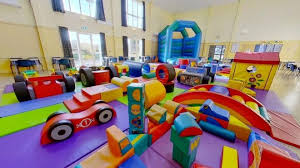
Exploring the Magic of Soft-Play Adventures for Children
The Joy of Soft Play: A World of Fun and Learning
Soft play areas have become a staple in the world of children’s entertainment, offering a safe and engaging space for little ones to explore, learn, and have fun. These colourful and interactive zones are designed to stimulate children’s senses and encourage physical activity in a controlled environment.
One of the key benefits of soft play is its ability to promote social interaction among children. As they navigate through ball pits, tunnels, slides, and climbing frames, kids learn valuable skills such as sharing, taking turns, and cooperating with others. These experiences help develop their communication and teamwork abilities from an early age.
Moreover, soft play areas provide a fantastic opportunity for children to improve their physical coordination and motor skills. Climbing up ladders or balancing on wobbly bridges helps enhance their balance, strength, and agility in a playful setting. This active play not only contributes to their physical development but also boosts their confidence as they conquer new challenges.
From themed play structures to sensory activities like textured walls and musical panels, soft play areas offer a diverse range of experiences that cater to different interests and abilities. Children can let their imaginations run wild as they explore various elements within these spaces, fostering creativity and cognitive development along the way.
Parents also benefit from soft play areas as they provide a secure environment for children to burn off energy while under supervision. It offers caregivers a chance to relax knowing that their little ones are engaged in safe play under the watchful eye of trained staff members.
In conclusion, soft play is not just about entertainment; it’s a valuable educational tool that nurtures children’s social, physical, and cognitive skills in an enjoyable setting. So next time you visit a soft play area with your child, remember that they are not just playing – they’re learning and growing in ways that will benefit them for years to come.
Benefits of Soft Play: Boosting Skills, Confidence, and Creativity in a Safe Environment
- Promotes social interaction and teamwork skills
- Enhances physical coordination and motor skills
- Encourages creativity and cognitive development
- Provides a safe environment for active play
- Offers caregivers a chance to relax while children play
- Helps build confidence as children conquer new challenges
Considerations for Soft Play: Hygiene, Overcrowding, and Supervision Challenges
- Risk of spreading germs and infections due to shared play equipment
- Potential for overcrowding during peak times, leading to longer wait times and less space for children to play
- Some soft play areas may lack adequate supervision, increasing the risk of accidents or conflicts among children
Promotes social interaction and teamwork skills
Soft play areas excel in promoting social interaction and teamwork skills among children. As they navigate through the various play structures, kids learn the importance of sharing, taking turns, and cooperating with others. Engaging in group play activities encourages communication and collaboration, fostering a sense of camaraderie and mutual support. These experiences not only enhance children’s social skills but also instil valuable lessons in teamwork that will benefit them in their interactions both on and off the playground.
Enhances physical coordination and motor skills
Soft play areas offer a fantastic opportunity for children to enhance their physical coordination and motor skills through engaging and interactive activities. By navigating through obstacles, climbing structures, and balancing on various elements, children develop their balance, strength, agility, and spatial awareness in a fun and stimulating environment. These physical challenges not only contribute to their overall physical development but also boost their confidence as they master new movements and conquer obstacles. Soft play encourages children to be active and adventurous while honing essential motor skills that will benefit them in various aspects of their lives.
Encourages creativity and cognitive development
Soft play areas provide an excellent platform for children to unleash their creativity and enhance their cognitive development. By engaging in imaginative play scenarios and exploring various textures, shapes, and colours, children are encouraged to think outside the box and come up with new ways to interact with their surroundings. This process not only stimulates their creativity but also strengthens their problem-solving skills, spatial awareness, and critical thinking abilities. Through the diverse range of activities offered in soft play settings, children have the opportunity to expand their minds and develop important cognitive skills that will benefit them both in play and in everyday life.
Provides a safe environment for active play
Soft play areas provide a safe environment for active play, allowing children to engage in physical activities and exploration without the risks associated with outdoor play. With cushioned surfaces, padded obstacles, and secure structures, parents can rest assured that their little ones can run, jump, and climb to their heart’s content without the fear of injury. This protective setting not only encourages children to be more adventurous in their movements but also instils confidence in them as they navigate through the various play elements. The safety measures in soft play areas create a worry-free space where children can freely express themselves and develop their physical abilities in a controlled and supervised setting.
Offers caregivers a chance to relax while children play
Soft play areas offer caregivers a much-needed opportunity to relax and unwind while their children engage in safe and stimulating play. Knowing that their little ones are in a secure environment under the supervision of trained staff allows parents to take a moment for themselves, whether it’s enjoying a cup of coffee, catching up on reading, or simply observing their children having fun. This aspect of soft play not only benefits the caregivers’ well-being but also strengthens the bond between parents and children, fostering a sense of trust and mutual enjoyment in shared experiences.
Helps build confidence as children conquer new challenges
Soft play areas play a crucial role in boosting children’s confidence as they conquer new challenges. Whether climbing a challenging structure, navigating through obstacles, or trying out a new slide, each accomplishment in a soft play setting contributes to a child’s sense of achievement and self-assurance. By overcoming obstacles and mastering new skills in a supportive environment, children learn to believe in their abilities and develop the resilience needed to tackle future challenges with confidence and determination.
Risk of spreading germs and infections due to shared play equipment
One significant concern associated with soft play areas is the potential risk of spreading germs and infections due to shared play equipment. With numerous children playing in close proximity and interacting with the same surfaces, such as ball pits, slides, and climbing structures, there is a higher likelihood of bacteria and viruses being transferred from one child to another. Despite efforts to maintain cleanliness through regular sanitisation, the nature of communal play spaces makes it challenging to eliminate all germs effectively. Parents and caregivers need to be vigilant in promoting good hygiene practices, such as hand-washing before and after play, to help minimise the spread of illnesses in these environments.
Potential for overcrowding during peak times, leading to longer wait times and less space for children to play
One significant drawback of soft play centres is the potential for overcrowding during peak times, which can result in longer wait times and limited space for children to play freely. The influx of visitors during busy periods may lead to a less enjoyable experience as kids may have to queue for popular attractions or navigate through crowded areas, reducing their opportunity to fully engage with the activities on offer. This overcrowding can also impact the overall safety and supervision of children, as staff may find it challenging to monitor every child effectively in a crowded environment.
Some soft play areas may lack adequate supervision, increasing the risk of accidents or conflicts among children
In some instances, the downside of soft play areas emerges when there is a lack of sufficient supervision. This shortfall in oversight can heighten the chances of accidents or conflicts among children within the play space. Without attentive monitoring and guidance from staff members, children may engage in risky behaviour or encounter challenges that could lead to injuries or disagreements with their peers. It is crucial for soft play facilities to prioritise effective supervision to ensure a safe and harmonious environment for all young visitors.



